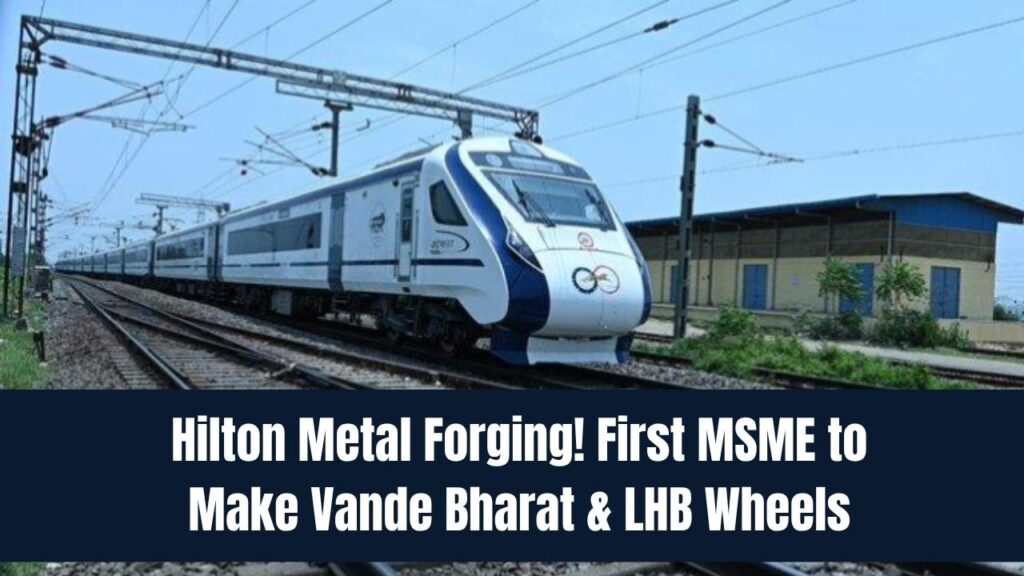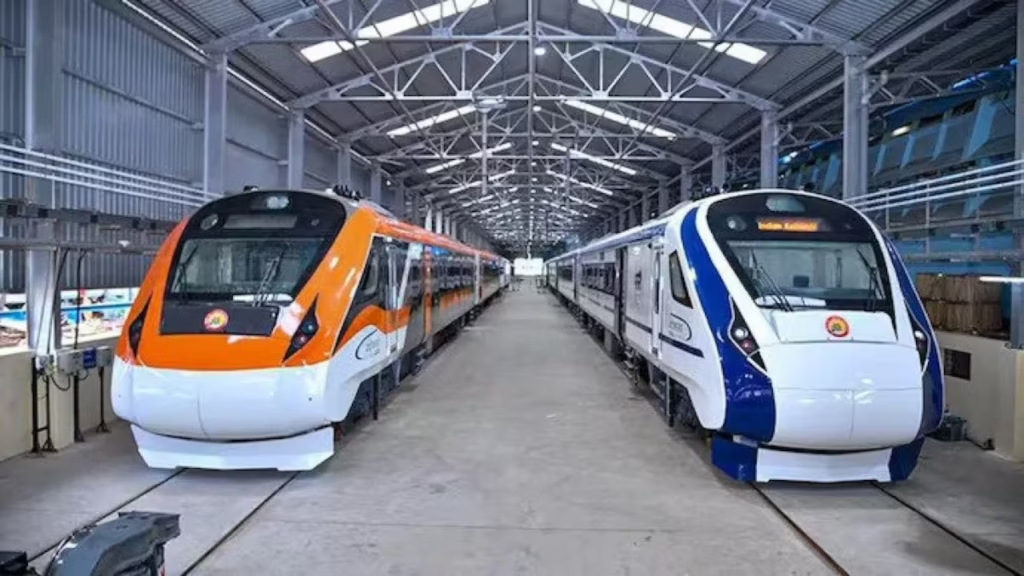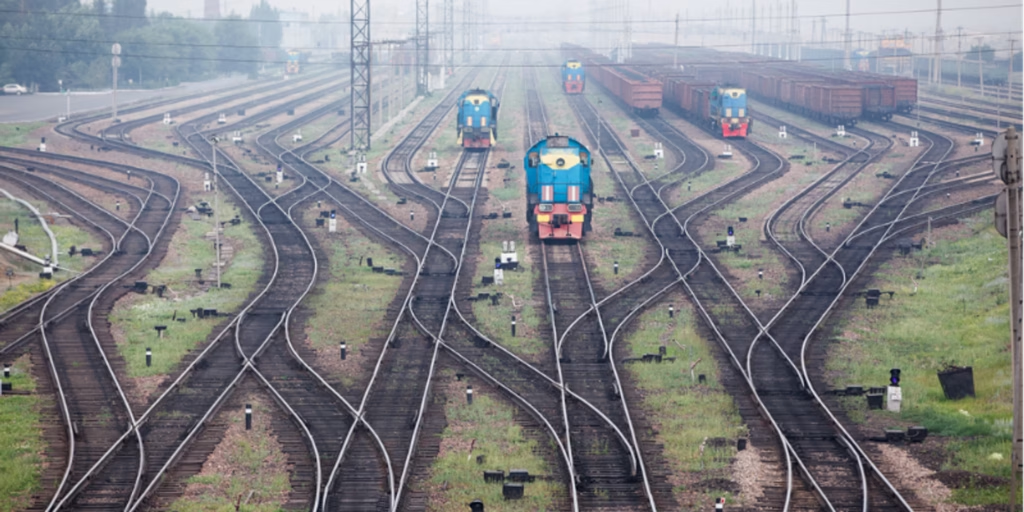Hilton Metal Forging Ltd. has recently achieved a significant milestone by becoming the first private Micro, Small, and Medium Enterprise (MSME) in India to receive the prestigious RITES Ltd. certification for manufacturing forged wheels for the Vande Bharat and Linke Hofmann Busch (LHB) coaches. This certification, granted on June 21, 2025, marks a crucial step in India’s push for greater self-reliance and technological advancement in the railway sector. Hilton Metal Forging’s success is an important development, not only for the company but also for the broader Indian manufacturing industry, which is increasingly focused on producing high-tech components for the rapidly modernizing railway network.

India’s railways have long been a cornerstone of the nation’s transportation infrastructure. However, they have faced significant challenges in modernizing and upgrading to meet the demands of a growing population and economy. With the ambitious goal of transitioning to high-speed, state-of-the-art trains like the Vande Bharat Express, India has placed a strong emphasis on indigenous production of critical components. This is where Hilton Metal Forging comes in, providing high-quality forged railway wheels that are essential for the operation of these advanced rail vehicles. By receiving certification from RITES Ltd., Hilton has successfully positioned itself as a key player in the future of India’s railway modernization.
This article takes a deep dive into the technological innovation behind forged wheels, the importance of this certification for both Hilton Metal Forging and India’s railway sector, and the broader implications for economic growth and self-reliance in the country’s manufacturing industry.
Hilton Metal Forging Becomes First MSME
| Key Details | Information |
|---|---|
| Certification | Hilton Metal Forging is the first MSME to receive RITES Ltd. certification. |
| Wheel Specifications | Vande Bharat: 952 mm diameter, LHB Coaches: 915 mm diameter. |
| Production Targets | FY26: 3,000+ forged wheelsets, FY27: 12,000+ units. |
| Installed Capacity | 20,000 wheelsets per annum. |
| Strategic Importance | Supports modernization of Indian Railways, contributing to self-reliance. |
| Link | Hilton Metal Forging Official Website |
Hilton Metal Forging’s achievement in securing RITES Ltd. certification to manufacture forged wheels for Vande Bharat and LHB coaches is an important moment in India’s railway history. This milestone will help modernize Indian railways, contribute to self-reliance in the sector, and support the Make-in-India initiative. As Hilton ramps up production and scales its manufacturing capacity, it will play a pivotal role in the future of rail travel in India.
What Does This Achievement Mean for India’s Railway Industry?

The achievement of Hilton Metal Forging is a significant leap forward for India’s railway manufacturing sector. This RITES Ltd. certification for producing forged railway wheels not only underscores Hilton’s manufacturing capabilities but also represents a much-needed shift towards self-reliance in India’s railway component production. Historically, India has relied on foreign suppliers for many of its high-tech railway components, such as wheels and traction motors. By enabling local MSMEs like Hilton to manufacture these components, India is moving closer to its goal of being fully self-sufficient in producing essential railway parts.
The Vande Bharat Express represents the cutting edge of high-speed rail technology in India. This semi-high-speed train is designed to travel at speeds of up to 160 km/h, making it one of the fastest trains in the country. Similarly, the LHB coaches, known for their superior safety features, are being increasingly used across Indian Railways. The forged wheels produced by Hilton will be integral to ensuring the safe, reliable, and efficient operation of both of these train types.
In addition to the technological leap, this achievement also bolsters the “Make-in-India” initiative, which encourages domestic production of high-quality components. Hilton’s certification exemplifies how private Indian companies can contribute to the nation’s modernization goals, positioning India as a global leader in railway manufacturing.
The Growing Role of MSMEs in India’s Railway Sector

The contribution of MSMEs to India’s manufacturing sector cannot be overstated. Traditionally, large state-owned or multinational companies have dominated high-tech sectors like railway component manufacturing. However, MSMEs are now emerging as critical players in India’s industrial landscape. The success of Hilton Metal Forging serves as a shining example of how small and medium enterprises can play an outsized role in contributing to India’s railway sector.
With the government’s focus on boosting the economy and creating jobs, the importance of MSMEs has only grown in recent years. By producing advanced components like forged wheels locally, MSMEs like Hilton are helping to reduce India’s dependence on foreign suppliers, thereby creating jobs and contributing to the national economy.
Furthermore, the Indian government has increasingly recognized the importance of supporting MSMEs through financial incentives, skill development programs, and easier access to technology. Hilton Metal Forging’s success story is a direct result of these efforts, highlighting the importance of nurturing and supporting small and medium-sized businesses in India.
The Importance of Forged Wheels in Railway Safety
When it comes to railway safety, the importance of forged wheels cannot be overstated. Trains, particularly high-speed trains like the Vande Bharat Express, are subjected to immense forces as they travel at high velocities. Forged wheels are able to withstand these forces due to their superior structural integrity, which is achieved during the forging process.
Forging is a technique that involves shaping metal under high pressure to increase its strength. The resulting product is significantly stronger and more durable than cast alternatives. This makes forged wheels ideal for trains that operate at high speeds and carry heavy loads.
For example, the Vande Bharat Express is designed to travel at speeds up to 160 km/h, which generates considerable force on the wheels. Forged wheels, made from high-quality steel alloys, are capable of handling these stresses, ensuring the train’s safety and operational efficiency. Moreover, forged wheels have a much higher fatigue resistance, which means they are less likely to crack or break under repeated use.
In addition to safety, efficiency is another key advantage of forged wheels. Trains equipped with high-quality wheels experience less wear and tear, which translates into lower maintenance costs and fewer disruptions to service. The increased reliability of these wheels also ensures that trains like Vande Bharat can operate smoothly and efficiently over long periods of time.
Role of Technology and Innovation in Modern Railway Manufacturing
Technological innovation is central to Hilton Metal Forging’s ability to produce high-quality forged wheels. In the past, wheel manufacturing was largely an artisanal process, with limited use of technology. However, in recent years, significant advances in manufacturing technology have revolutionized the production of railway wheels.
Today, Hilton Metal Forging uses state-of-the-art machinery and advanced metallurgical processes to produce forged wheels. This includes the use of high-tech CNC machines for precision shaping and robotic arms for automated assembly. The use of advanced software also ensures that each wheel meets the necessary specifications for weight, size, and surface smoothness.
By adopting these cutting-edge technologies, Hilton is not only improving the quality of its products but also increasing the efficiency of its operations. This allows the company to scale up production to meet growing demand, while also reducing production costs.
Furthermore, Hilton Metal Forging is focused on continuous innovation. This includes improving the material properties of the wheels to ensure greater durability, reducing energy consumption in the manufacturing process, and exploring new techniques to improve the forging process.
Challenges in the Railway Manufacturing Industry
While India has made great strides in railway modernization, the country’s railway manufacturing industry still faces several challenges. These challenges include:
- Technological Gaps: Many Indian manufacturers still struggle with outdated machinery and technology. This has made it difficult for some companies to keep up with the increasing demand for high-tech components like forged wheels.
- International Competition: India faces stiff competition from established foreign manufacturers who have decades of experience and advanced technology at their disposal. Competing with these companies requires a significant investment in R&D, training, and advanced manufacturing techniques.
- High Initial Investment: Setting up manufacturing plants capable of producing high-quality forged wheels requires substantial capital investment. This is often a barrier for MSMEs that do not have the necessary financial resources to invest in state-of-the-art equipment.
Despite these challenges, Hilton Metal Forging has managed to overcome these hurdles through strategic partnerships, continuous investment in technology, and a focus on innovation. The company’s success is a testament to the resilience and determination of India’s private sector in overcoming the obstacles that often come with high-tech manufacturing.
Impact on Local Economy and Employment
The growth of Hilton Metal Forging has a positive impact on the local economy. By establishing a manufacturing facility that produces forged railway wheels, Hilton is contributing to the growth of the local industrial ecosystem. The company’s expansion creates jobs in various sectors, including manufacturing, engineering, and logistics.
Furthermore, by reducing the reliance on foreign imports, Hilton is helping India retain valuable foreign exchange and reduce its trade deficit. This contributes to the overall growth of India’s industrial base, positioning the country as a global player in railway manufacturing.
Additionally, the growth of local manufacturing has a multiplier effect on the economy. As Hilton Metal Forging increases production, it creates opportunities for other industries, such as raw material suppliers, logistics companies, and maintenance service providers. This leads to the creation of more jobs and economic opportunities across the value chain.
Government’s Role in Supporting MSMEs
The Indian government has played an important role in supporting the growth of MSMEs through initiatives like Make in India, Atmanirbhar Bharat, and various financial schemes that provide easier access to capital and technology. These programs have been instrumental in helping companies like Hilton Metal Forging achieve success in the highly competitive railway manufacturing sector.
Government initiatives aimed at boosting industrial growth, creating job opportunities, and fostering technological innovation have made it easier for MSMEs to thrive. For Hilton Metal Forging, the government’s support has provided the foundation for scaling its operations and securing key certifications like the one from RITES Ltd.
Global Perspective: Railway Manufacturing Around the World
When we look at countries with advanced railway systems, such as Germany, Japan, and China, we can see the significant role that local manufacturers play in their railway sectors. In these nations, railway manufacturers are often state-owned enterprises or large private corporations. However, in recent years, smaller companies and MSMEs have also begun to make an impact, contributing to high-tech components like train wheels.
India’s move to localize production of railway wheels is consistent with global trends, where countries are increasingly focused on building self-reliant and sustainable transportation systems. By strengthening its local supply chains, India is taking a significant step toward becoming a global leader in rail manufacturing.
Indian Navy SSR/MR Exam Date 2025 Announced—Admit Card Download Link & Full Schedule Inside
Indian Stock Market Opens Strong: Sensex Soars 600 Points, Nifty Crosses 25,000 Mark
Indian Highways Management 2025 Engineer Recruitment—Check Selection Process, Salary & Apply Now
FAQs
1. What is RITES Ltd. certification, and why is it important for Hilton Metal Forging?
RITES Ltd. is a government enterprise that certifies manufacturers of railway components for quality and safety. Hilton Metal Forging’s RITES certification allows it to manufacture forged wheels for the Vande Bharat and LHB coaches, ensuring the wheels meet industry standards.
2. How does Hilton Metal Forging contribute to India’s railway modernization?
By manufacturing high-quality forged wheels locally, Hilton helps reduce India’s reliance on foreign suppliers, supports the Make-in-India initiative, and strengthens the country’s railway infrastructure.
3. Why are forged wheels crucial for high-speed trains like Vande Bharat?
Forged wheels are more durable and stronger than cast wheels. They can withstand the higher stresses and speeds of trains like Vande Bharat, ensuring both safety and efficiency.
4. What are the production targets for Hilton Metal Forging in the coming years?
Hilton plans to produce over 3,000 forged wheelsets in FY26, with production scaling up to 12,000+ units by FY27, with an installed capacity of 20,000 wheelsets per annum.







